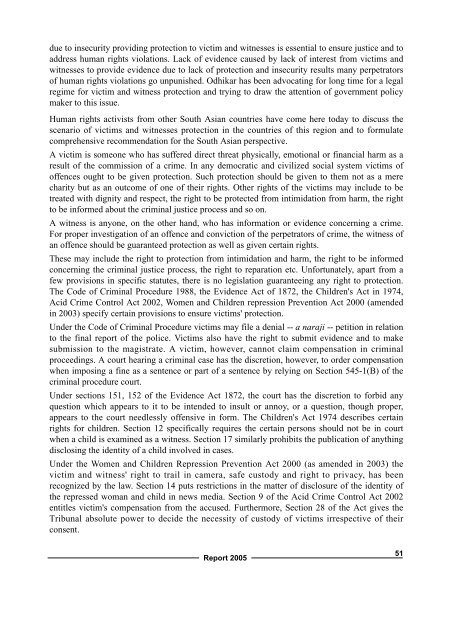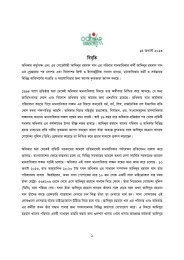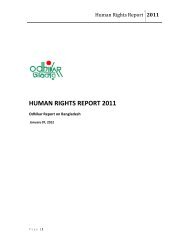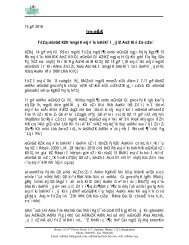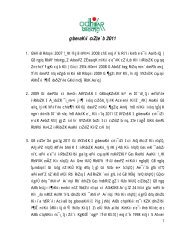Please - Odhikar
Please - Odhikar
Please - Odhikar
You also want an ePaper? Increase the reach of your titles
YUMPU automatically turns print PDFs into web optimized ePapers that Google loves.
due to insecurity providing protection to victim and witnesses is essential to ensure justice and to<br />
address human rights violations. Lack of evidence caused by lack of interest from victims and<br />
witnesses to provide evidence due to lack of protection and insecurity results many perpetrators<br />
of human rights violations go unpunished. <strong>Odhikar</strong> has been advocating for long time for a legal<br />
regime for victim and witness protection and trying to draw the attention of government policy<br />
maker to this issue.<br />
Human rights activists from other South Asian countries have come here today to discuss the<br />
scenario of victims and witnesses protection in the countries of this region and to formulate<br />
comprehensive recommendation for the South Asian perspective.<br />
A victim is someone who has suffered direct threat physically, emotional or financial harm as a<br />
result of the commission of a crime. In any democratic and civilized social system victims of<br />
offences ought to be given protection. Such protection should be given to them not as a mere<br />
charity but as an outcome of one of their rights. Other rights of the victims may include to be<br />
treated with dignity and respect, the right to be protected from intimidation from harm, the right<br />
to be informed about the criminal justice process and so on.<br />
A witness is anyone, on the other hand, who has information or evidence concerning a crime.<br />
For proper investigation of an offence and conviction of the perpetrators of crime, the witness of<br />
an offence should be guaranteed protection as well as given certain rights.<br />
These may include the right to protection from intimidation and harm, the right to be informed<br />
concerning the criminal justice process, the right to reparation etc. Unfortunately, apart from a<br />
few provisions in specific statutes, there is no legislation guaranteeing any right to protection.<br />
The Code of Criminal Procedure 1988, the Evidence Act of 1872, the Children's Act in 1974,<br />
Acid Crime Control Act 2002, Women and Children repression Prevention Act 2000 (amended<br />
in 2003) specify certain provisions to ensure victims' protection.<br />
Under the Code of Criminal Procedure victims may file a denial -- a naraji -- petition in relation<br />
to the final report of the police. Victims also have the right to submit evidence and to make<br />
submission to the magistrate. A victim, however, cannot claim compensation in criminal<br />
proceedings. A court hearing a criminal case has the discretion, however, to order compensation<br />
when imposing a fine as a sentence or part of a sentence by relying on Section 545-1(B) of the<br />
criminal procedure court.<br />
Under sections 151, 152 of the Evidence Act 1872, the court has the discretion to forbid any<br />
question which appears to it to be intended to insult or annoy, or a question, though proper,<br />
appears to the court needlessly offensive in form. The Children's Act 1974 describes certain<br />
rights for children. Section 12 specifically requires the certain persons should not be in court<br />
when a child is examined as a witness. Section 17 similarly prohibits the publication of anything<br />
disclosing the identity of a child involved in cases.<br />
Under the Women and Children Repression Prevention Act 2000 (as amended in 2003) the<br />
victim and witness' right to trail in camera, safe custody and right to privacy, has been<br />
recognized by the law. Section 14 puts restrictions in the matter of disclosure of the identity of<br />
the repressed woman and child in news media. Section 9 of the Acid Crime Control Act 2002<br />
entitles victim's compensation from the accused. Furthermore, Section 28 of the Act gives the<br />
Tribunal absolute power to decide the necessity of custody of victims irrespective of their<br />
consent.<br />
Report 2005<br />
51


